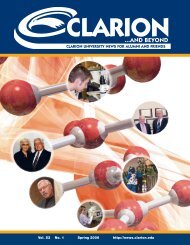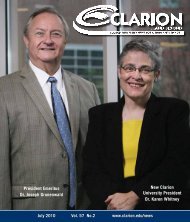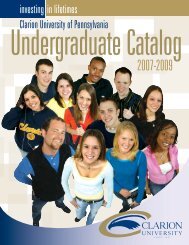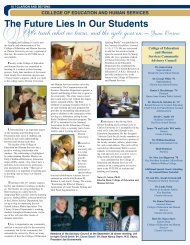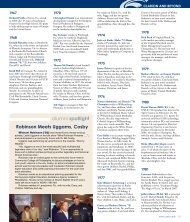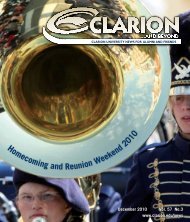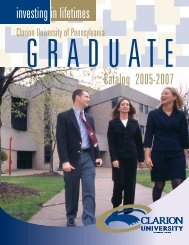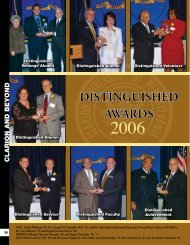Graduate - Clarion University
Graduate - Clarion University
Graduate - Clarion University
- No tags were found...
You also want an ePaper? Increase the reach of your titles
YUMPU automatically turns print PDFs into web optimized ePapers that Google loves.
8 <strong>Clarion</strong> <strong>University</strong> of Pennsylvania<strong>Graduate</strong> Study at<strong>Clarion</strong> <strong>University</strong>evidence of financial support.6. Carry a full program of studies (at least ninesemester hours) upon admission and matriculation.The Bureau of Citizenship and ImmigrationServices regulations require students holding an“F” or “J” visa to carry a full program of study.7. Be covered by adequate health insurance. Due tothe high cost of health care in the United States,all international students are required to carrycomprehensive medical insurance. For furtherinformation on insurance, see section entitled“Student Health Insurance” on page 16.Academic Policies andProceduresAcademic Honesty PolicyStudents at <strong>Clarion</strong> <strong>University</strong> shall maintain a highstandard of honesty in scholastic work. As members ofthe university community, students have a responsibilityto be familiar with the conduct regulations found in theuniversity catalogs, Student Handbook and Calendar;Residence Hall Handbook; Student Rights, Regulations,and Procedures Handbook, and other university documents.Among the conduct regulations addressed are acts ofacademic dishonesty, including plagiarism or cheating onassignments, examinations, or other academic work, orwithout prior approval of the instructor, submitting workalready done for another course.Students shall avoid all forms of academic dishonesty,including but not limited to:1. Plagiarism-the use of another’s words withoutattribution and without enclosing the words inquotation marks. Plagiarism may also be defined asthe act of taking the ideas or expression of ideas ofanother person and representing them as one’s ownevenif the original paper has been paraphrased orotherwise modified. A close or extended paraphrasemay also be considered plagiarism even if the sourceis named.2. Collusion-when specifically prohibited in advanceby the instructor, collaborating with another personin the preparation of notes, themes, reports, or otherwritten work offered for credit.3. Cheating on an examination or quiz-giving orreceiving information or using prepared materialon an examination or quiz.4. Falsification of data-manufacturing data,falsification of information, including providingfalse or misleading information, or selective use ofdata to support a particular conclusion or to avoidconducting actual research.Any member of the academic community may bringcomplaints of academic dishonesty against a student.Sanctions for academic dishonesty can range from afailing grade on a particular assignment or examination todismissal from the university based on the seriousness ofthe action and whether it is part of a pattern of academicdishonesty. Instructors imposing a lowered or failinggrade on an assignment or course because of a charge ofacademic dishonesty must inform the student. Studentshave the right to appeal instructor decisions (StudentRights, Regulations, and Procedures Handbook) eitherthrough the grade-appeal process (see section on StudentRights in the Classroom) or directly to the ConductBoard (see section on Adjudication Appeals) dependingon the nature of the dispute. Sanctions extending beyonda particular course, such as suspension or dismissal froman academic program or from the university, can onlybe imposed as the result of complaints filed under theDisciplinary Procedures Code and after Formal Hearingsunder this code.Good Academic StandingAll graduate students are expected to remain in goodacademic standing by maintaining a cumulative QPA of3.00/4.00 and earning no more than six semester hours of“C” or lower grades in graduate courses.Students who do not maintain a cumulative QPA of3.00/4.00 and/or who earn more than six hours of creditwith grades below a “B” are automatically placed onprobation. A student placed on probation must returnto “good academic standing” through grades earned incourse work during the next semester or summer sessionin which he or she enrolls. A student may be removedfrom probation by:A. Taking additional courses in his or her program andearning grades sufficient to raise the cumulativeQPA to 3.00/4.00 or above. This single measuremay be sufficient unless the student has more thansix semester hours of “C” grades.B. Repeating courses in which the original grade isless than “B.” A repeat course grade will replacethe original grade for quality-point calculations. Amaximum of six semester hours of credit may berepeated. Library science students receiving a gradeof less than “B” in two courses are disqualified asa candidate in that degree program.Failure to meet this requirement will result in thestudent being dropped from the graduate program in whichhe or she is enrolled.A student placed on probation automatically loseshis or her graduate assistantship. A reapplication for anassistantship will be required once he or she has returnedto “good academic standing.”Transfer of CreditSome graduate programs allow students to transfercredit for graduate courses taken at other regionallyaccreditedinstitutions for coursework of higher academiccaliber in accepted fields of study. It is university policythat no more than 30 percent of the total credits for adegree may be transfer credits. The course(s) takenmust be recognized in content and quality as similar



